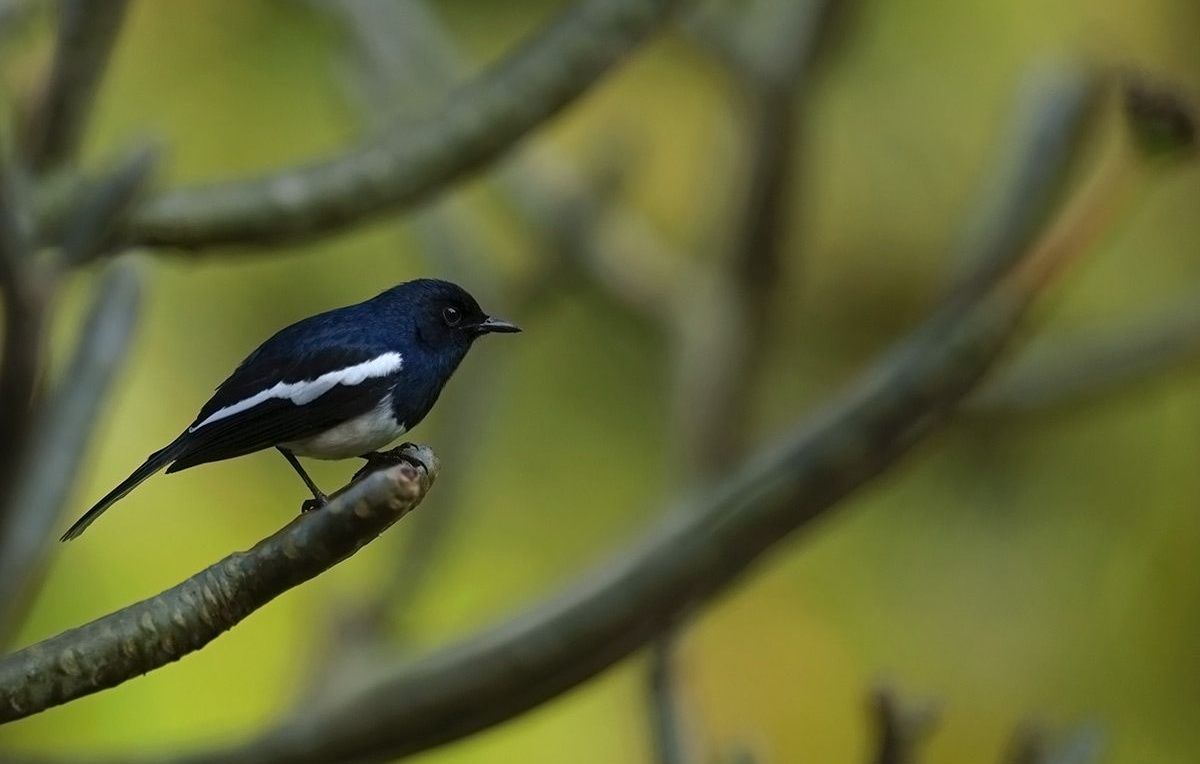An Aural Journey through Kabini: The Beginnings
Published on: 01/04/2022
Published on: 01/04/2022

Photo title: Oriental Magpie-Robin
|Photo Credits: Santosh Saligram

Santosh Saligram is a writer, editor, photographer, designer and content-and-communications strategist from Bengaluru, who is enamoured with ‘all things sentient' and the tragically futile effort of capturing their magic through creative media. Santosh describes himself as a 'pen-and-camera-wielding raconteur', for his style involves narrating a story in partnership with images, films and graphics to sing paeans of the mystery and joy that are inherent in Nature. He's been a photography mentor, leading tours to various wildernesses for nearly a decade, authored at least two known books partly or fully, and been awarded both nationally and internationally for his pictorial work.
Butterfly Safari in the Western Ghats: a possibility?
Desert Bones and Dust Trails: Reading the Kalahari’s Ancient Ground
Life in the Sands: The Surprising Riches of the Kalahari
Peek into Coorg’s Culture at Madikeri’s Government Museum
The Kalahari in Miniature: What You Miss When You Only Look for Big Game
Anegundi’s quiet empire of women: the banana-fibre story
Little Feet, Ancient Rhythms: Young Keepers of the Kodava Culture
Water, Wildlife, and the Art of Waiting in the Kalahari
Tracking Wildlife: What the Sand Tells You in the Kalahari
Singing of confluences, tangible and intangible
Strange Encounters: What We See and What We Miss
Water, Stone, and Empire: Reading Vijayanagara in the Evolve Back Kamalapura Palace
The Unusual Suspects: Creatures You Didn’t Expect in the Kalahari
The Ultimate Family Safari: Multigenerational Travel in Africa Creates Unforgettable Bonds
Locking Horns: An Afternoon with the Other King
The Arboreal By-lanes of Coorg: A Street Photographer's Foray into Bird Photography
Lone Warrior: An Encounter with the Grey-headed Fish Eagle
Under the Kalahari Sky: A Journey Through Africa’s Night Sky
Reptilian Sibilances, Mollusc Stillnesses, Fern Rustlings
Sri Purandara Mantapa: A hall that echoes the raagas of devotion
Cultural Extravaganza: Kodava Music & Dance Forms
The Kalahari Skies: An Everchanging Canvas of Colour
The San People of the Central Kalahari Game Reserve: Guardians of an Ancient Culture
Anegundi: ‘Monkey Business’ in the ‘Elephant Pit’
African Wild Dogs - one of Africa's most captivating carnivores and most endangered species
Discovering the Brown Hyenas of the Central Kalahari Game Reserve
An Aural Journey through Nagarahole: The Sound of Life
Five Wildlife Sightings You Can Expect Without Going on Safari
Into the Valley of Deception: The Central Kalahari Game Reserve
The Cup That Cheers: The Changing Taste of Coffee
Craft Calling: Traditional Lambani Arts and Crafts and the Sandur Kushala Kala Kendra
An Aural Journey through Nagarahole: The Language of Deception
An Aural Journey through Nagarahole: The Sound of Tardiness
Taking Terrific Photos on Safari: Getting the Trophy Shot
Adapt and Survive: Reaching the Pinnacle of Specialisation
Into the night – nocturnal life in the Kalahari
An Aural Journey through Nagarahole: The Seen and the Sawing
Hampi Ruins in the 1900s: Stellar Photographs From A Forgotten Historical Text
Touring Kabini with Your Eyes Closed: An Aural Journey through Nagarahole: Alarms True and False
North Karnataka’s Threesome — Badami, Aihole, & Pattadakallu
Hampi Ruins in the 1900s — The Gateways into the City
A Lone Porcupine fights off an entire pride of Lions!
The cute little denizens of the Kamalapura Palace, Hampi
From the Kitchens of Evolve Back – Jallad Roti | Akki Roti
From the Kitchens of Evolve Back – Qubani ka Meetha and Shahjahani ka Meetha
From the Kitchens of Evolve Back – Murgh-e-Lazeez
From the Kitchens of Evolve Back – Nizami Machali ka Salan
From the Kitchens of Evolve Back – Dum ki Nalli
From the Kitchens of Evolve Back – Anapa Ginjala Pulusu
An Aural Journey through Kabini: Pre-Dawn Critters and Jitters
From the Kitchens of Evolve Back – Raan-e-Kamalapura
From the Kitchens of Evolve Back – Baghara Baingan
From the Kitchens of Evolve Back – Natukodi Pulusu
From the Kitchens of Evolve Back – Tondekai Palya
From the Kitchens of Evolve Back – Royala Igaru
From the Kitchens of Evolve Back – Koli Chuttada
From the Kitchens of Evolve Back – Karibelle Cutlet
The Battle of Talikota and the Sacking of Hampi
From the Kitchens of Evolve Back – Kori Ghee Roast
Ten Interesting Facts About the Kalahari Desert
From the Kitchens of Evolve Back – Vazhachundum Thoran
From the Kitchens of Evolve Back – Mezze Platter
From the Kitchens of Evolve Back – Grilled Pork Ribs
An Aural Journey through Kabini: The Beginnings
Harihara & Bukka: founders of the Vijayanagara Empire
From the Kitchens of Evolve Back – Pazham Puzhungiyathu
From the Kitchens of Evolve Back – Peppercorn chocolate mousse
From the Kitchens of Evolve Back – Kabsah Laham Bis
From the Kitchens of Evolve Back – Vazhakanda Thoran
From the Kitchens of Evolve Back – Banana Bajji
From the Kitchens of Evolve Back – Pazham pori
From the Kitchens of Evolve Back – Joojeh – e – Koobideh
From the Kitchens of Evolve Back – Vegetable Kurma
From the Kitchens of Evolve Back – Pandi Curry
From the Kitchens of Evolve Back – Kerala Fish Curry
Nalknad Palace – off the beaten track in Coorg
Designing the Sidapur Coffee and Culture Museum
Why you should put a backwater boat safari at the forefront of your Kabini visit – 2
Why you should put a backwater boat safari at the forefront of your Kabini visit – 1
Chikka Veerarajendra of Coorg and his Thirteen Wives
The Architecture of Ainmanes: Form follows Function
Kodava Ainmanes – the heart of the Kodava Clan
From the Kitchens of Evolve Back – Sutta Sigadi Mathu Hannugalu
From the Kitchens of Evolve Back – Masala Raagi Cheela
From the Kitchens of Evolve Back – Tandoori Zaffrani Paneer & Tandoori Phool
From the Kitchens of Evolve Back – Tumbida Ginnu
From the Kitchens of Evolve Back – Raagi Mudde Bassaru
From the Kitchens of Evolve Back – Hurida Meke Mamsa
From the Kitchens of Evolve Back – Masala Hoo Kosu
From the Kitchens of Evolve Back – Kuruba Adina Saru
From the Kitchens of Evolve Back – Sutta Naati Koli
From the Kitchens of Evolve Back – Savatekayi Suttadu
From the Kitchens of Evolve Back – Kendadali urida sigadi mathu meenu
From the Kitchens of Evolve Back – Bidirinalli Beyisida Koli
From the Kitchens of Evolve Back – Hurida Koli
First glimpse of god – the Black Panther of Kabini
The Battle of Raichur: The Beginning of the End